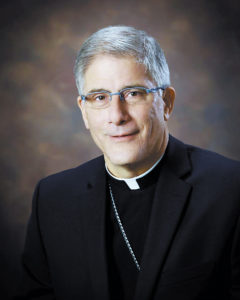
Bishop Joseph R. Kopacz
By Bishop Joseph Kopacz
On February 6, I quietly marked the fifth anniversary of my ordination and installation as the 11th bishop of the Diocese of Jackson. As we know some days never end, but a decade can pass in the twinkling of an eye. (1Cor 15) For me the past five years are officially history, having moved at the speed of a weaver’s shuttle, (Job 7,6).
Many events and memories stand out vividly; some have to be recalled by scrolling through my i-Phone calendar; others surface when I revisit schools and parishes and, still others when someone recalls an event or encounter in conversation.
All of it is to say that the Lord has blessed me abundantly through the episcopal ministry he so graciously bestowed upon me five years ago.
Even the current troubles do not suppress the beauty, truth and goodness that have flowed from our Mission and renewed Vision. Each day we have the opportunity to proclaim the Gospel by the way we live our lives so that all can experience the crucified and risen Lord.
The engaging design of our diocesan Vision reminds me wherever I am in the diocese about our priorities of inspiring disciples, serving others and embracing diversity, as was on display at our just completed diocesan youth conference. (See page 7 for photos)
The Vision has been embraced and applied in creative ways throughout the diocese through the application of our Pastoral Priorities, especially to be inviting and reconciling communities and to teach our Catholic faith by being good scribes in the Kingdom of Heaven in many and varied ways. We recall the words of Jesus in Matthew’s Gospel: “Therefore every scribe who has been trained for the kingdom of heaven is like a householder who brings out of his treasure what is new and what is old,, (13,52).
We can think of all of the channels for communication and evangelization at our fingertips, that which is new, as well as the proven time tested ways of witnessing, encountering and accompanying.
Our first Pastoral Priority to be inviting and reconciling communities recognizes the fundamental call of the Lord to repent and rebuild one’s life and Church on the demands of the Gospel. This call is ever ancient and ever new, and must be vigorously applied to the suffering of the sexual abuse crisis, and the targeted financial upheaval in our diocese.
Crucified with the Lord we can rise with him to new life.
On February 6, my anniversary (which by the way also happens to be my father’s birthday), I am set to take the long flight to India for my first pastoral visit to the land that is blessing us with dedicated priests and missionary disciples. Going to Saltillo, Mexico, each year to our mission of 50 years can be a stretch, but the Indian subcontinent will be unchartered waters for me.
I will be going with my trusty guide, Father Albeen Vatti, pastor of Saint Francis in Madison, of the Diocese of Warangal where we will spend time with Bishop Bala, visiting many pastoral settings as well as some of the families of the priests who are serving currently in the Diocese of Jackson. From there we will travel to other Indian States for pastoral visits, as well as for seeing countless points of interests along the way. The culture and way of life of this densely-populated nation will make for an up close and personal experience at every bend in the road. I am looking forward to this opportunity to visit the land where Saint Thomas the Apostle planted the seeds of the Gospel.
As I briefly pause to reflect upon this five year milestone in my life, although there will be 18 hours of flying time to India to do considerable reflection, I am deeply grateful to so many coworkers in the vineyard of the Lord who serve throughout the diocese. These are the ordained, religious and lay women and men who have responded as disciples to the demands of the Gospel.
For example, more than 500 were on hand for the Diocesan Professional Development Day this past Monday led by Monica Applewhite, a leading practitioner in the field of abuse prevention. It sounds like a biblical number of disciples to whom the Lord has appeared gathered in one place, (1Cor 15,6).
This event is merely a sampling of the countless coworkers in our diocese busy about the Lord’s designs that the mere mentioning of them would far exceed the available space in this edition of the Mississippi Catholic.
The beauty of prayer is that it reaches from one end of the earth to the other and pierces the heavens. During the two weeks that I will be in India I will remember all y’all and the needs of our diocese especially at the altar each day.
I know that your prayer will also reach across the miles asking the Lord’s blessings on this extraordinary pastoral visit as I represent you to the people of India.

